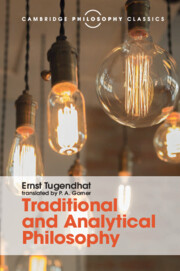Translator's preface
Published online by Cambridge University Press: 05 August 2016
Summary
My aim throughout this translation has been to combine accuracy with readability, but at times the latter quality has had to take second place. Whenever possible, long sentences have been broken down into several shorter ones, but in some cases to have done this would have significantly altered the sense of what is being said.
As for my translation of individual words the following require some comment. For Vorstellung I have used ‘representation’ rather than ‘idea’, for to have chosen the latter would have made it impossible to translate the verbal forms vorstellen, vorgestellt etc. I considered the more literal ‘presentation’, but in the end settled for ‘representation’ because of the currency it has acquired through Kemp Smith's translation of the Critique of Pure Reason. For both Bezugnahme, bezugnehmen and Verweisung, verweisen I have had to use ‘reference’, ‘refer’. For the most part it is clear from the context which sense is intended, but where there is the possibility of confusion I have put the German term in brackets. For gegenständlich I have used the artificial ‘objectual’ because ‘objective’ would have been positively misleading. Gegenständlich means something like ‘having the character of an object’. It has nothing to do with ‘objective’ in the sense in which, for example, a judgment may be objective (rather than subjective).
In translating quotations from Husserl's Logische Untersuchungen I have in the main followed J. N. Findlay's translation. In the case of Wittgenstein I have simply reproduced the standard English translations without making any changes.
I would like to thank Professor Tugendhat for the thoroughness of his comments at every of the translation, my friends Eric Matthews and Guy Stock for some very helpful discussions of points relating to the translation, and the German Academic Exchange Service (DAAD) for enabling me to have two periods of study in Germany with consequent benefit to my knowledge of German philosophy and the German language. Finally, I wish to thank Professor Hans Werner Arndt of the University of Mannheim for having first drawn my attention to Professor Tugendhat's book.
- Type
- Chapter
- Information
- Traditional and Analytical PhilosophyLectures on the Philosophy of Language, pp. xiii - xivPublisher: Cambridge University PressPrint publication year: 2016



